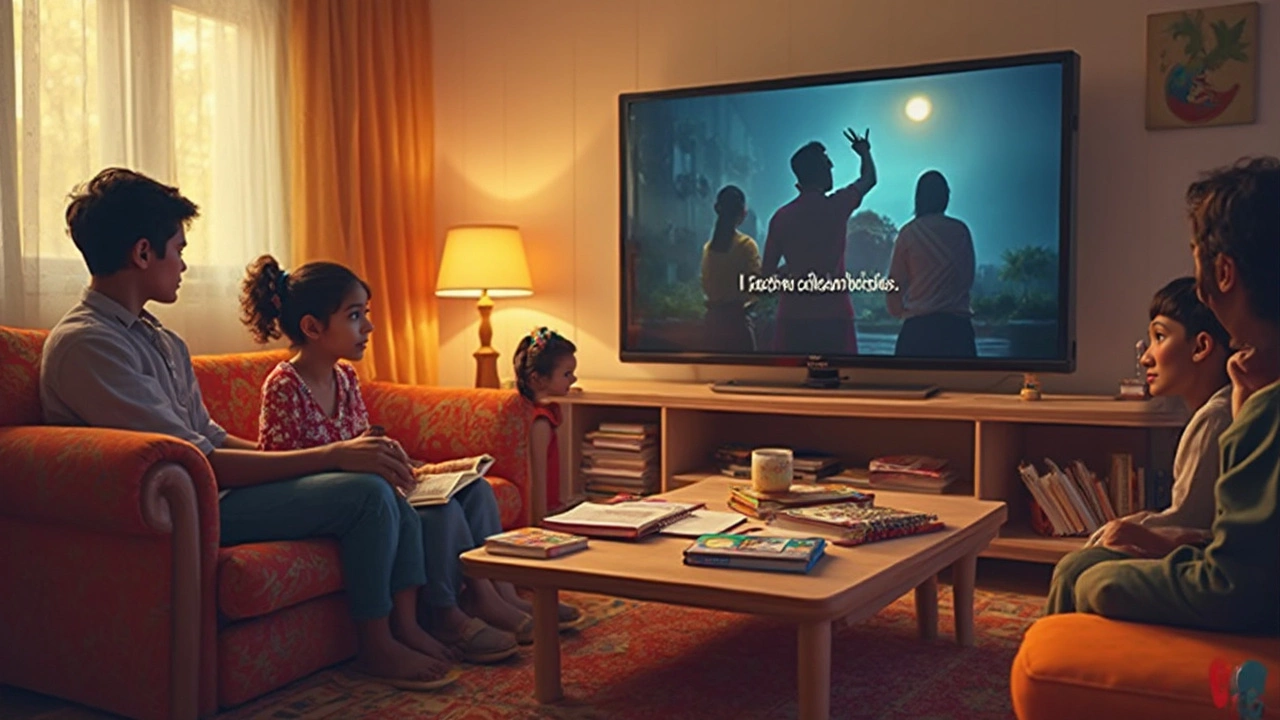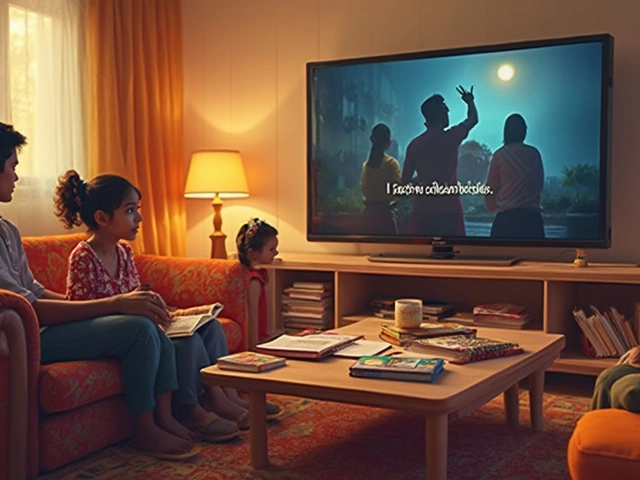Learning English isn’t just about textbooks or grammar drills—you can actually pick up a ton by watching the right TV series. A lot of popular shows use everyday language, real accents, and give you a peek into how people actually talk outside the classroom. That’s something you just don’t get from most English language courses.
Not all series are helpful, though. Some use slang or heavy accents that can actually make things tougher if you’re just starting out. So, knowing what to watch is key if you don’t want to waste hours and end up more confused. Choosing the right show for your level means you’ll actually enjoy yourself and learn way faster.
- Why TV Series Works for Learning English
- Top Series for Beginners
- Best Picks for Intermediate Learners
- Advanced Shows for Polishing Skills
- Tips to Learn Effectively While Watching
Why TV Series Works for Learning English
Binge-watching the right TV series can be surprisingly effective for improving your English. You’re getting non-stop real conversations, common phrases, and all kinds of accents—no grammar exercises needed. That means you’re exposed to the actual flow of the language, like how people change sentences when they’re joking or serious. Textbooks usually miss that.
TV shows are all about context. When characters make jokes, argue, or show emotion, you can figure out words or phrases even if you don’t get every single word. This kind of learning—called “contextual learning”—sticks with you much longer than just memorizing lists.
Watching TV also lets you see body language, hand gestures, and facial expressions—these extras help you make sense of the talk. For anyone aiming to improve their English learning skills, this is gold because it makes the language real, not just random lines on a page.
| How TV Series Helps | Textbook Limitation |
|---|---|
| Expose you to real accents and slang | Mainly teach standard pronunciation |
| Show everyday phrases in action | Focus on formal expressions |
| Repeat key words in different contexts | Give one example per rule |
| Engage you emotionally—makes learning sticky | Learning feels like a chore |
One study by Cambridge English found that learners who listen to authentic material like TV and movies get better at listening and picking up new vocabulary twice as fast as those who only use lessons and textbooks. If you’re watching with subtitles, you’re not just practicing listening—you’re matching it up with how stuff is really spelled, and that pays off big time.
So, if you’ve ever felt bored or stuck while trying to learn from a book, switching to series just might be the game changer.
Top Series for Beginners
If you’re just starting out, picking TV series with clear pronunciation, simple grammar, and slower dialogue makes a huge difference. Shows made for young viewers or about daily life are perfect for this. They help you get comfortable with the basics, like greetings and common phrases, without feeling lost.
Improve English sounds easy when you start with the right shows. Here are a few that really work:
- Friends: This classic sitcom is a favorite. The jokes are simple, the speech is clear, and you’ll find tons of everyday English. “How you doin’?” is probably the first catchphrase you’ll pick up.
- Extra English: Made especially for people learning English, this series has exaggerated acting and super-clear lines. The episodes build basic vocabulary and show people dealing with daily problems. You’ll hear the same useful words over and over.
- Pepper Ann or Arthur: These animated series use simple sentences, so even kids can follow. But honestly, they’re fun for adults too if you want to get the feel for conversational English without any complicated slang.
- The Big Bang Theory (for upper beginners): While some jokes are about science, the main conversations are easy to follow, and you’ll get used to regular accents. Plus, there are tons of repeats on streaming services so you can rewatch tricky bits.
Here’s a quick look at the key things beginners need in a series:
| Show | Pace | Vocabulary Level | Main Accent |
|---|---|---|---|
| Friends | Slow-Medium | Basic | American |
| Extra English | Slow | Very Basic | British/American Mix |
| Arthur | Slow | Basic | American |
| The Big Bang Theory | Medium | Basic-Intermediate | American |
Turn on subtitles in English—not your native language. Seeing the words as you hear them helps match sounds to spelling, and you’ll recognize phrases quicker. If something’s confusing, don’t stress. Pause, rewind, and replay short sections until you understand what’s going on. This active watching turns your Netflix habit into real practice.

Best Picks for Intermediate Learners
Once you can follow basic conversations in English, it’s time to level up with series that mix clear speech with a bit more challenge. Shows in this category expose you to real-world dialogues, new phrases, and different accents, but won’t leave you completely lost.
Friends is hands-down the most recommended series for those aiming to improve English. The language is simple, the jokes are easy to catch, and everyday situations give you tons of useful vocabulary. Nearly every English learner knows about "Friends"—there’s a reason language teachers still use it in class. Even my son Aarav likes to parrot Joey’s funny catchphrases around the house!
Another solid pick is The Office (US version). It uses clear American English, everyday work vocabulary, and lots of short conversations. You’ll hear natural pauses, real sarcasm, and how people speak both formally and informally. Don’t worry if you miss some jokes at first. Subtitles can help (try English subtitles, not your native language).
If you’re into something more current, Brooklyn Nine-Nine is a police comedy where the dialogue is quick but not too hard. The humor is lively, and you’re exposed to modern slang and casual English. The episodes are short, so it’s easy to tackle one a day.
- Stick with shows that have average-length episodes (20-30 minutes).
- Watch with English subtitles for the first round, then try a second time without them to push your understanding.
- Don’t worry about understanding everything—focus on picking up new phrases and seeing how they’re used in real situations.
Picking a series you genuinely enjoy makes a huge difference. If you’re bored halfway through, you won’t stick with it, and that’s when you stop learning. Explore until you find a show that hooks you. Once you’re into it, learning almost happens by accident.
Advanced Shows for Polishing Skills
If you’ve already got the basics down and want to get comfortable with natural English the way fluent speakers use it, you need something with more bite. These advanced series give you vocabulary, slang, cultural jokes, and complex topics—basically, everything people use in real life. They’re especially useful if you’re trying to sound sharper in conversations or at work.
Shows like "The West Wing" are a goldmine for hearing fast-paced, smart dialogue. The political talk might be a stretch, but you’ll pick up the kind of confident phrasing and quick wit used in professional settings. If you’re into law, try "Suits"—it’s full of legal jargon, but it makes tough words less scary because you see exactly when and how people use them.
Want something with accents and slang from different places? Watch "Sherlock" from the UK for sharp British slang and clever comebacks. Or, if you want American humor, "Brooklyn Nine-Nine" is packed with jokes, puns, and typical workplace banter—you’ll get used to listening for punchlines and fast talk.
One cool thing: research from Cambridge English shows learners who regularly watch full episodes of advanced English shows scored 23% higher on speaking tests than those sticking with easy shows or YouTube clips. The trick is in the mix—complex storylines, wordplay, and the need to follow fast conversations.
| Show | Country | Main Benefit | English Accent |
|---|---|---|---|
| The West Wing | USA | Professional, fast conversation | American |
| Suits | USA | Legal vocabulary, negotiation | American |
| Sherlock | UK | British slang, sharp idioms | British |
| Brooklyn Nine-Nine | USA | Workplace jokes, fast dialogue | American |
Here’s how to make these advanced shows work for you:
- Watch with English subtitles—not in your language. This helps you link spoken and written words.
- Pause and rewind when you miss something; don’t just let it slide.
- Repeat tricky lines out loud. Your ears and tongue need the practice.
- If a phrase or word pops up more than once, write it down and look it up. You’ll spot patterns after a few episodes.
- Try watching with a friend who’s also into learning English. You’ll notice things together and fill gaps for each other.
The key here is active watching, not just sitting back. Treat it like a behind-the-scenes lesson in how English is actually spoken in different places and situations.

Tips to Learn Effectively While Watching
If you really want to improve your English learning with TV shows, you have to do more than just binge-watch. You need a game plan. Here’s what actually works, based on what language teachers recommend and what’s proven to help learners stick with it.
- Turn on the subtitles—in English: Watching with English subtitles helps you connect the words you hear to how they're written. It also boosts your listening and reading skills at the same time. Just don’t rely on your native language subtitles or you’ll miss a lot of good practice.
- Pause and repeat: Don’t be afraid to rewind and watch quick conversations more than once. If you hear a phrase you didn’t catch, repeat it until it clicks. This extra effort actually helps your brain remember new words and expressions.
- Keep a notebook: Jot down phrases or words you don’t know. Later, look them up and try to use them in real conversations. This hands-on approach works a lot better than just passive watching.
- Pick shows that match your level: If a show feels overwhelming, switch to something simpler. There’s no benefit in struggling to understand every word. Kids’ series and sitcoms are great for beginners, while dramas or documentaries give more challenge for advanced learners.
- Try shadowing: This means repeating lines after the actors, almost like echoing them. It’s awkward at first but improves pronunciation, rhythm, and confidence. Some people use a recorder to check their progress.
One more tip—don’t focus on understanding every single word. The aim is to get the main idea, pick up useful phrases, and get comfortable with real-speed English. Over time, your ear gets used to it, and that’s when you really start seeing results.



